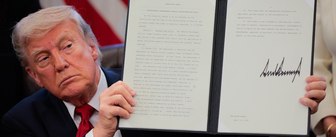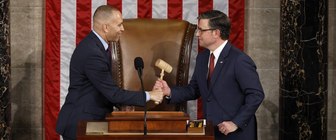There has been a lot of talk lately about the value and accuracy of political science forecasts of election outcomes. Both Nate Silver at FiveThirtyEight.com and John Sides at the same site have made clear the strengths and weaknesses of these models.
Since my work was referenced in both posts, I write to underscore one thing that has not been highlighted enough in the conversation so far: The value in election forecasting based on economic indicators is in predicting which party will win --- not by how much that party will win. Why is this important? Because knowing which party is likely to win helps us understand the importance of the billion dollars spent on campaigns. Once we know the economic context and the prediction, we can systematically, and well in advance, strategize about how each party should go about crafting a winning message.
Let’s do a simple forecast: Change in GDP over two quarters prior to the election, presidential approval from July, and an incumbency indicator (Seth Hill, John Sides, and I have just run these models for 1948-2008 for a project we are working on). If we do this forecast from 1948 to 2008, we correctly predict which party wins 75% of the time.
Now, to be clear --- if we flipped a coin, we’d be right 50% of the time, on average. So, 75% is a decent improvement. Could we do better? Probably. For example, if we included the last trial-heat poll before the election we’d have a pretty good chance of getting the outcome right, but that’s not much of a forecast since it happens only a few days before the election. The beauty of our model is that we can run the model and make predictions in July.
I think there’s value in this – and to make that point, think about it this way: If you were considering a run for the presidency, would you want to know what this forecast predicts for your party? I think you would; 12 out the last 16 elections are correctly predicted by the model, of course you want to know what is says about your chances for winning.
But what if it says your party is likely to lose? As I lay out in The Message Matters, we learn a lot from the four elections that the forecasts get wrong (and so do potential candidates!) In 1960 and 1976 for example, the candidate who was not predicted to win based on a forecast actually won the election. How did that happen? And why is it so rare? A close reading of presidential campaign messages over the last 60 years reveals that it is rare because it is hard. It is hard to beat an incumbent in a growing economy; even if you are fighting a war in Vietnam. Even if you are mired down in conflict in Iraq and Afghanistan. Even if unemployment is 8%.
In 1960, John F. Kennedy turned the election into an all-out war for the future of the world with the Soviets on the other side. He made the contest about missiles, and who had more, but also about education and the arts. In speeches, he eloquently asked Americans to consider whose symphonies would be played in the great concert halls around the world --- our’s or their’s? And whose poetry would be read at great universities? He weaved the war with the Soviets into everything he talked about --- and eventually, Richard Nixon was talking about it, too. “High hopes?” Nixon said at one campaign stop. “We all have high hopes. I have high hopes, too. . .” High Hopes was one of Kennedy’s campaign theme songs.
Here’s the take-away: campaigns matter. Maybe not in the wholesale manner that most pundits want candidates to believe (campaigns are not swaying 30 percent of the vote, for example), but they do matter -- and they are critical in many cases (precisely because they sway 3 percent of the vote!)
Who among us doesn’t think Al Gore would have won the 2000 election at the Electoral College level if he had connected himself to Bill Clinton’s growing economy? The forecasts for 2000 all predict a Gore victory and because he didn’t win the election, critics say the forecasting models are “wrong.” I say Gore was wrong! He didn’t talk about the economy, he didn’t take credit for the goods the Clinton administration brought to Americans --- and because he didn’t link himself to that growth, he narrowly lost the Electoral College. That is not a failure of the model – that is a failure of the candidate.
Back to the fundamental question: If you were running for president, would you want to know what political science forecasting models predict about your party’s fortunes? As Stanley Greenberg said, presidential candidates and their consultants ignore this work at their peril. If you are predicted to win, talk about the economy and own it. If you are predicted to lose --- find something else onto which the election can be reset. An issue on which you are closer to most voters and your opponent is constrained by an unpopular position. The latter is very hard and because of that, it is rare, which is why sometimes when we evaluate forecasts based on the economy it looks like campaigns don’t matter much --- but this is just because most candidates who are predicted to win understand they have to talk about the economic growth, and when they do that, they win! Only Gerald Ford in 1976 lost after implementing this strategy.
Election forecasts based on economic indicators are valuable not for their point-estimates, but for their overall predictions about which party is likely to win the election. They are valuable because they tell candidates what kinds of campaigns to run and they help analysts understand a priori, in a systematic manner, why some strategies are winning ones and others are not.








